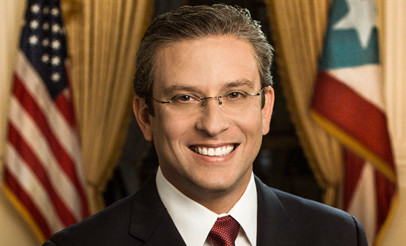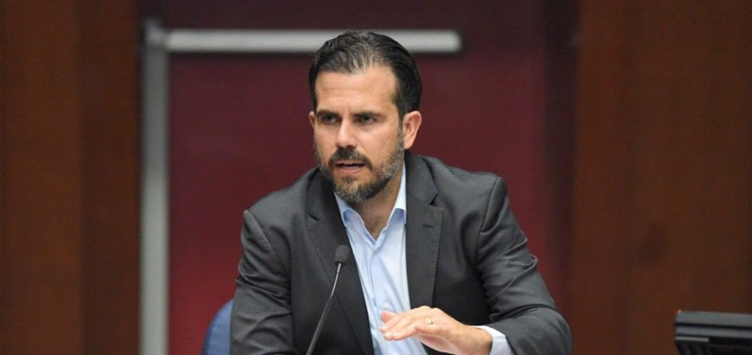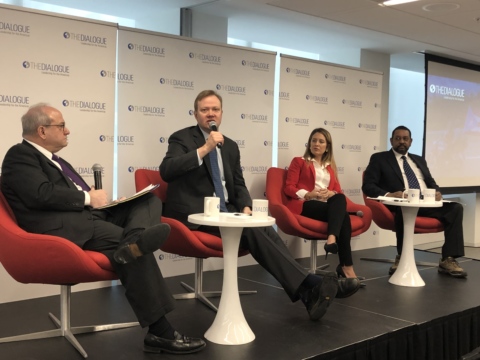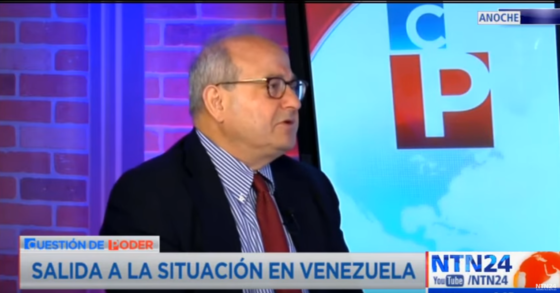
Will the US Heed Puerto Rico’s ‘Distress Call’?
Should the US government help Puerto Rico get out from under its debt? What is the best way to approach the task?
A Daily Publication of The Dialogue
Protesters and police have clashed on multiple days in Puerto Rico as demonstrators called for the ouster of Governor Ricardo Rosselló. Protests followed the leak of hundreds of pages of messages containing misogynistic and homophobic statements between the governor and his closest aides, as well as the arrests of several former Puerto Rico officials in a corruption probe related to the alleged steering of several funds to politically connected, unqualified contractors. What are the underlying factors that led to protests against Rosselló, and how likely are they to succeed in pushing the governor to resign? If Rosselló steps down, who would replace him as governor? How could the controversy affect Rosselló’s agenda, including the advancement of the island’s debt restructuring deal? How significant is the graft case, and to what extent does it reflect general corruption in Puerto Rican politics?
Silvia Álvarez Curbelo, historian at the Luis Muñoz Marín Foundation and retired professor in the school of communication of Puerto Rico University: “Mass protests led by artists, students, pension-holders, diaspora groups, labor unions and communities have prompted Puerto Rico’s leading newspaper, El Nuevo Día, to ask Governor Ricardo Rosselló on Monday to step down. The island needs efficient and honest leadership that can handle the severe fiscal, economic and social conditions that affect 3.3 million American citizens. An inadequate federal response to the category 5 hurricane that struck on September 2017 and resulted in more than 4,000 deaths is compounded by a corruption-riddled Rosselló administration that has viewed recovery efforts after Hurricane María as a business opportunity for local cronies and mainland U.S.-based carpetbaggers. Extended prevarication and waste of public funds have also crippled Puerto Rico’s leverage to restructure its public debt amid abysmal GDP figures and significant migration to the mainland United States. Austerity measures advocated by the Financial Oversight and Management Board have targeted mainly social programs and the University of Puerto Rico’s budget, which is vital for the territory’s recovery. The revelation of a profanity-laced chat administered by Governor Rosselló illuminates his administration’s depth of corruption, dereliction of pubic duties and disregard for human suffering. He must resign. As to his administration’s agenda, there is no way that any significant initiative can be undertaken due to public mistrust. The future is bleak also because his party, the PNP, which advocates statehood for Puerto Rico and will appoint a caretaker administration until 2020 in case Rosselló leaves office, has been fully complicit in this ongoing tragedy.”
Pedro Reina-Pérez, professor of humanities at the University of Puerto Rico and visiting scholar at Harvard University: “The public outburst of anger is a combination of various traumas, namely, the government’s bankruptcy, the imposition of a Financial Oversight and Management Board dispensing austerity measures, two catastrophic hurricanes and a slow recovery. Eleven consecutive days of protests is historic. There is no precedent for a governor’s resignation. So far, Rosselló has quit as the president and gubernatorial candidate of the New Progressive Party (PNP), but he refuses to leave the governorship. Per the Puerto Rico Constitution, should he resign or be impeached, the secretary of state would take his place, followed by the secretary of justice, secretary of the treasury and so forth. There is no secretary of state, however, as he quit. The secretary of justice is next in line. The protests have brought the island to a standstill. Politicians are literally in hiding to avoid incurring the public’s wrath. There is no way forward for the governor’s agenda. Talks with creditors will be severely affected, and the board may see this as an opportunity for a power grab. This is the real tragedy. The six arrests carried out by the FBI included Julia Keleher, the former secretary of education. She closed more than 400 schools in two years and totally disregarded the communities affected. She was one of the closest officials to the governor, and he defended her aggressively. Should she be convicted (the trial will be in May 2020), it would be embarrassing and devastating for the PNP. Pay-for-play schemes have been rampant in Puerto Rican politics and particularly in the PNP. The governor’s father was in office from 1993-2001 and saw more than 40 members of his administration indicted for corruption. What is new is the temerity with which it happened. The chat revealed how confident the governor and 10 others were of their power to control everything, even the media. Impunity seemed natural, but events tore that assumption to pieces, and now they are being publicly shame—total infamy that extends to the entire political class.”
Francisco J. Rodríguez-Castro, president and chief executive officer at Birling Capital: “No one runs for governor without a need and desire to wield power. Running for a position such as the governor of Puerto Rico requires lots of work, from fundraising to planning the country’s agenda, to dealing with a running mate, mayors, senators and all that comes with it. So, to relinquish the much-earned bid for re-election and the New Progressive Party’s (PNP) presidency are not easy decisions. First, you immediately become a lame-duck and powerless governor while facing an impeachment process. Such a process may start against Governor Rosselló as soon as Puerto Rico’s House of Representatives passes an impeachment resolution. This action will provide the appropriate committee the authority to investigate whether sufficient grounds exist to impeach the governor of any crimes or misdemeanors, primarily related to the ‘Telegram chat’ scandal. This investigation could take as long as a year. The impeachment process against Rosselló may very well result in his departure from office—either by impeachment or resignation. Meanwhile, Senate President Thomas Rivera Schatz has assumed the presidency of the PNP.”
The Latin America Advisor features Q&A with leaders in politics, economics, and finance every business day. The publication is available to members of the Dialogue’s Corporate Program and others by subscription.
Should the US government help Puerto Rico get out from under its debt? What is the best way to approach the task?
“Puerto Rico 2019: What Lies Ahead?” brought together a panel of experts on economics, fiscal issues, and energy policy to discuss the current state of Puerto Rico’s recovery and its future prospects.
El 31 de julio, Michael Shifter analizó varios temas de la región en el programa Cuestión de Poder de NTN24. El presidente del Diálogo ofreció su opinión sobre el estado de Venezuela, las protestas en Puerto Rico, el futuro de la economía en la región, y lo que simboliza la estancia del expresidente salvadoreño en Nicaragua, entre otras preguntas sobre América Latina.
 For several days, protesters have taken to the streets to demand the resignation of Puerto Rico
Governor Ricardo Rosselló. // File Photo: Commonwealth of Puerto Rico.
For several days, protesters have taken to the streets to demand the resignation of Puerto Rico
Governor Ricardo Rosselló. // File Photo: Commonwealth of Puerto Rico.
 Video
Video
 Video
Video